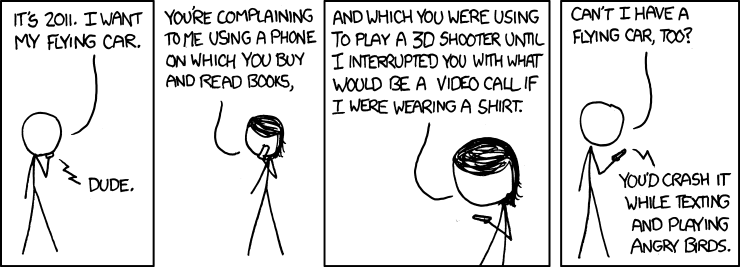
The rate of technological progress is an incredibly complex subject and is open to interpretation depending on how you define your terms and weight your metrics. I see a huge surge starting around the 1870s and running more or less uninterrupted* through the 1960s followed by a perhaps inevitable leveling off to a more sustainable rate in the past few decades but I've heard well-reasoned arguments that paint a completely different picture.
Having acknowledged this diversity of opinion, there's still a wonderful irony to using a video phones to counter the argument that technology isn't delivering what was promised because we were promised video phones for an awfully long time. As early as 1891, Alexander Graham Bell was thinking seriously about the subject:
"Should it be found... [that the image sensor] is illuminated, then an apparatus might be constructed in which each piece of selenium is a mere speck, like the head of a small pin, the smaller the better. The darkened selenium should be placed in a cup-like receiver which can fit over the eye… Then, when the first selenium speck is presented to an illuminated object, it may be possible that the eye in the darkened receiver, should perceive, not merely light, but an image of the object… "By 1930, AT&T was testing prototypes. By 1936, the German postal service had a public video phone service available. Research into wireless systems was going on at the same time.
And through all this, for about a hundred years, there was a constant stream of stories in newspapers and magazines like Popular Science announcing that it wouldn't be long before every home had a video phone. Young boys and girls who grew up reading these stories died of old age reading the same headlines. Given this history, it's difficult to be that impressed by the rate of innovation.
I would argue that for the past few decades, most areas of technology have advanced at about the rate we expected with more areas under-performing than exceeding expectations. There are any number good arguments to the contrary, but none of them use the video phone as an example.
p.s. I don't think great-granddad would be all that dazzled by texting either.
* I'm not sure about the Thirties. Does anyone have any thoughts on the effects of the Great Depression on technology?
No comments:
Post a Comment